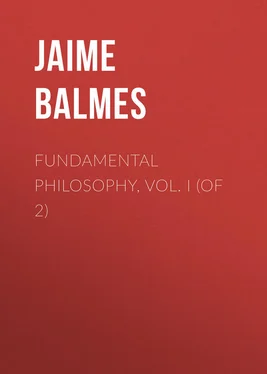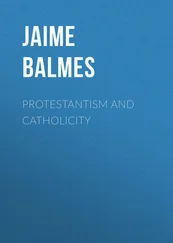Jaime Balmes - Fundamental Philosophy, Vol. I (of 2)
Здесь есть возможность читать онлайн «Jaime Balmes - Fundamental Philosophy, Vol. I (of 2)» — ознакомительный отрывок электронной книги совершенно бесплатно, а после прочтения отрывка купить полную версию. В некоторых случаях можно слушать аудио, скачать через торрент в формате fb2 и присутствует краткое содержание. Жанр: foreign_antique, foreign_prose, на английском языке. Описание произведения, (предисловие) а так же отзывы посетителей доступны на портале библиотеки ЛибКат.
- Название:Fundamental Philosophy, Vol. I (of 2)
- Автор:
- Жанр:
- Год:неизвестен
- ISBN:нет данных
- Рейтинг книги:3 / 5. Голосов: 1
-
Избранное:Добавить в избранное
- Отзывы:
-
Ваша оценка:
- 60
- 1
- 2
- 3
- 4
- 5
Fundamental Philosophy, Vol. I (of 2): краткое содержание, описание и аннотация
Предлагаем к чтению аннотацию, описание, краткое содержание или предисловие (зависит от того, что написал сам автор книги «Fundamental Philosophy, Vol. I (of 2)»). Если вы не нашли необходимую информацию о книге — напишите в комментариях, мы постараемся отыскать её.
Fundamental Philosophy, Vol. I (of 2) — читать онлайн ознакомительный отрывок
Ниже представлен текст книги, разбитый по страницам. Система сохранения места последней прочитанной страницы, позволяет с удобством читать онлайн бесплатно книгу «Fundamental Philosophy, Vol. I (of 2)», без необходимости каждый раз заново искать на чём Вы остановились. Поставьте закладку, и сможете в любой момент перейти на страницу, на которой закончили чтение.
Интервал:
Закладка:
The same doctrine is found in another place, 8 8 Q. 12a, A. 8o
where he asks if they who see the divine essence see all things in God.
128. Representation of ideality is that which neither proceeds from the identity of the thing representing with that represented, nor from the relation of cause and effect. Our ideas are of this class, for they are neither identical with their objects nor do they cause them. It is impossible for us to know whether, besides this representative force which we experience in our ideas, there are finite substances capable of representing things distinct from, and not caused by, themselves. Leibnitz maintains that there are such substances; but, as we have seen, his system of monads must be regarded as merely hypothetical. It is better to say nothing than to make conjectures which lead to no result; we shall therefore content ourselves with establishing the following propositions:
I. If any being represent another which is not its effect, it has not this representative force of itself, but has received it from another.
II. The communication of intelligences can only be explained by recurring to a first intelligence, which, being the cause of the others, can give them the force to act upon one another, and consequently to produce representation.
129. Causality may be a principle, but is not a sufficient reason, of representation.
In the first place, a cause cannot represent its effect unless intelligible in itself. Thus, although we attribute to matter an activity of its own, we cannot concede it the power to represent its effects, for want of the indispensable condition of immediate intelligibility.
130. In order that effects may be intelligible in their cause, it must of necessity possess the character of cause in its fulness, by uniting all the conditions and determinations requisite to the production of the effect. Free causes do not represent their effects, because these effects with relation to their causes are found only in the sphere of possibility. The production may be realized, but is not necessary; and thus the possible, but not the real, is seen in the cause. God knows future contingencies, which depend upon the human will, not precisely because he knows the activity of man, but because he sees in himself, without succession of time, not only all that may, but all that will happen; since nothing can exist in the present or in the future without his will or permission. He also knows future contingencies dependent solely on his own will, because he knows from all eternity what he has resolved, and his decrees are indefectible and immutable.
131. Even if we refer to the necessary order of nature, and suppose one or more second causes to be known, it is not possible to see in them all their effects with entire security, unless the cause act in isolation, or all the others are known together with it. As experience shows us that all the parts of nature are in intimate and reciprocal communication, we cannot suppose the above isolation, and consequently the action of every second cause is subjected to the combinations of others, which may either impede or modify its effect. Hence the difficulty of establishing general, and at the same time, perfectly safe laws in all that concerns nature.
132. The preceding considerations, it is to be observed, demonstrate anew the impossibility of transcendental science based upon a fact from which all other facts proceed. Intellectual representation is not explained by substituting necessary emanation for free creation. Even supposing the variety of the universe to be purely phenomenal, and at bottom only a being always one, identical, and absolute, it cannot be denied that the phenomena are governed by certain laws, and subject to various conditions. Either the human intellect can see the absolute in such a way as to discern by a simple intuition whatever is contained in it, all that it is or can be, under all possible forms; or else it is condemned to follow the unfolding of the unconditioned, the absolute, and the permanent, through its conditioned, relative, and variable forms. The former, which is a sort of ridiculous plagiarism from the dogma of beatific vision, is, in treating of the intellect in its present state, so palpable an absurdity, as to merit neither debate nor refutation. The latter subjects the intellect to all the fatigue of investigation, and destroys at one blow all the illusory promises of transcendental science.
133. The understanding is, in its acts, subject to a law of succession, or the idea of time. The same thing obtains in nature, whether it is so verified in reality, or time is considered as a subjective condition which we transfer to objects; be this doctrine of Kant, which we shall in due time examine, as it may, it is certain that succession, at least for us, exists, and that we cannot ignore it. In this hypothesis an infinite evolution can be known to us only in an infinite time. Thus, by a metaphysical necessity, we are unable to know not only the future evolution of the absolute, but also the present and the past. This evolution being absolutely necessary, according to the doctrine to which we have reference, an infinite succession must have preceded us; thus the present organization of the universe must be regarded as one round of an unlimited ladder, which in the past as in the future, has no measure but eternity. We can know the present state of the world solely by observation, and then only to a very limited degree; we must, therefore, of necessity, deduce it from the idea of the absolute, by following it in its infinite evolution. Were this not, however, in itself radically impossible, it would, nevertheless, labor under the inconvenience of being too long a task to be accomplished in the life-time of any one man, or even in that of all men who have ever lived, taken collectively.
134. But let us return to the representation of causality. The ideal representation may be reduced to that of causality; for since a spirit can have no idea of an object not produced by it, unless communicated to it by another spirit, the cause of the thing represented, we infer that all purely ideal representations proceed either directly or indirectly, mediately or immediately, from the cause of the objects known. And since, on the other hand, as we have already seen, the first being knows things distinct from himself only, as he is their cause; we hold the representation of ideality to be reduced to that of causality, thus in part verifying the principle of Vico, the profound Neapolitan thinker: "the intellect only knows what it does."
135. From this doctrine flow two consequences of which we must take note:
I. There are only two primitive sources of intellectual representation: identity and causality. That of ideality is necessarily derived from that of causality.
II. In the real order, the principle of being is identical with the principle of knowledge. That only which gives being can give knowledge. The first cause can give knowledge only in so far as it gives being: it represents because it causes.
136. The representation of ideality, although connected with that of causality, is yet really distinct from it. The explanation of its nature belongs indeed to the treatise on ideas; but we cannot relinquish, without an illustration, a point so closely connected with the problem of intellectual representation.
Some conceive ideas to be a sort of image or copy of the object; but this is true only with respect to the representations of the imagination, that is, the purely corporeal; and even here it is necessary to suppose the external world to be such as the senses present it, which, however, under many aspects, is not true. To be convinced how illusory is the theory founded on the likeness of sensible things, we have only to ask, what the image of a relation is, or, how causality, substance, and being are portrayed. In the perception of these ideas, there is something more profound than any thing apparent in sensible things, something of an entirely different order. Necessity has led us to compare the understanding to an eye which sees, and the idea to an image present; but this is only a comparison; the reality is something more mysterious, more secret, more intimate: there is an ineffable union between the perception and the idea: man cannot explain it, but he experiences it.
Читать дальшеИнтервал:
Закладка:
Похожие книги на «Fundamental Philosophy, Vol. I (of 2)»
Представляем Вашему вниманию похожие книги на «Fundamental Philosophy, Vol. I (of 2)» списком для выбора. Мы отобрали схожую по названию и смыслу литературу в надежде предоставить читателям больше вариантов отыскать новые, интересные, ещё непрочитанные произведения.
Обсуждение, отзывы о книге «Fundamental Philosophy, Vol. I (of 2)» и просто собственные мнения читателей. Оставьте ваши комментарии, напишите, что Вы думаете о произведении, его смысле или главных героях. Укажите что конкретно понравилось, а что нет, и почему Вы так считаете.












